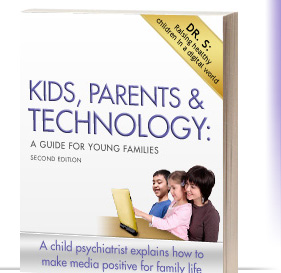6.28.10
Brilliant technological innovators bless us almost daily with new opportunities, unimaginable even months ago, that challenge our best thinkers (among them David Pinsky, Nicholas Carr, Steven Johnson, Sherry Turkle and others) to predict the how these new tools will impact our culture and civilization. Burgeoning neuroscience, seemingly promising to finally explain how our brains function as the organs of our minds, has created a fashionable concern with how we input and process information. But frankly, I cannot help chuckling as I imagine a serious clan of self-aware mavens among our pre-historic ancestors, each holding a newly-wrought iron tool for the first time, heatedly discussing, as we do in these pages, how their lives will be impacted by miraculous technologies currently seducing their tribe-mates and kids. But, alas, I pretty much doubt that they came anywhere even close to predicting what they were actually in for.
Sadly, awareness of the effect on child rearing and child development now seems more urgent then ever, but is receiving relatively less attention in the current discussion. As a child psychiatrist, in reality an “applied neuroscience engineer” for almost forty years, I do have some pragmatic suggestions. This is what we know: We cannot predict accurately the broad potential of most individual babies. However, we can definitely anticipate that “good enough mothering” (Winnecott), whether by parent or grandparent, will give our youngsters the best start, scaffolding, and launch. We already know enough to do that well enough: People do need to be present face to face and kids with full loving attention to get wired correctly; kids need unscheduled, undistracted time to learn to reflect, and they need face to face peer contact to be fully human. The important focus of child rearing is making families that give kids and parents what they need to maximize the intelligent, creative, moral, social, lovable beings that children’s brains and genomes would allow. Technology need not be our enemy as long as we keep our focus on these goals. Our job now is to fit technology into our parenting and not vice versa.
So let’s please shift the debate and focus on what we want for ourselves and our families and to ways to exploit our brilliant new tools to accomplish this precious task. Let’s stop debating how many angels can text on a pinhead, and let’s use technologies as opportunities to promote the development of social brains (after all, that is why it evolved in the first place) from infancy through adulthood. The rest is commentary. Bottom line: Please, let’s chill and go back to basics.



RE: HOW MANY ANGELS CAN TEXT ON A PINHEAD?
6.28.10
Brilliant technological innovators bless us almost daily with new opportunities, unimaginable even months ago, that challenge our best thinkers (among them David Pinsky, Nicholas Carr, Steven Johnson, Sherry Turkle and others) to predict the how these new tools will impact our culture and civilization. Burgeoning neuroscience, seemingly promising to finally explain how our brains function as the organs of our minds, has created a fashionable concern with how we input and process information. But frankly, I cannot help chuckling as I imagine a serious clan of self-aware mavens among our pre-historic ancestors, each holding a newly-wrought iron tool for the first time, heatedly discussing, as we do in these pages, how their lives will be impacted by miraculous technologies currently seducing their tribe-mates and kids. But, alas, I pretty much doubt that they came anywhere even close to predicting what they were actually in for.
Sadly, awareness of the effect on child rearing and child development now seems more urgent then ever, but is receiving relatively less attention in the current discussion. As a child psychiatrist, in reality an “applied neuroscience engineer” for almost forty years, I do have some pragmatic suggestions. This is what we know: We cannot predict accurately the broad potential of most individual babies. However, we can definitely anticipate that “good enough mothering” (Winnecott), whether by parent or grandparent, will give our youngsters the best start, scaffolding, and launch. We already know enough to do that well enough: People do need to be present face to face and kids with full loving attention to get wired correctly; kids need unscheduled, undistracted time to learn to reflect, and they need face to face peer contact to be fully human. The important focus of child rearing is making families that give kids and parents what they need to maximize the intelligent, creative, moral, social, lovable beings that children’s brains and genomes would allow. Technology need not be our enemy as long as we keep our focus on these goals. Our job now is to fit technology into our parenting and not vice versa.
So let’s please shift the debate and focus on what we want for ourselves and our families and to ways to exploit our brilliant new tools to accomplish this precious task. Let’s stop debating how many angels can text on a pinhead, and let’s use technologies as opportunities to promote the development of social brains (after all, that is why it evolved in the first place) from infancy through adulthood. The rest is commentary. Bottom line: Please, let’s chill and go back to basics.